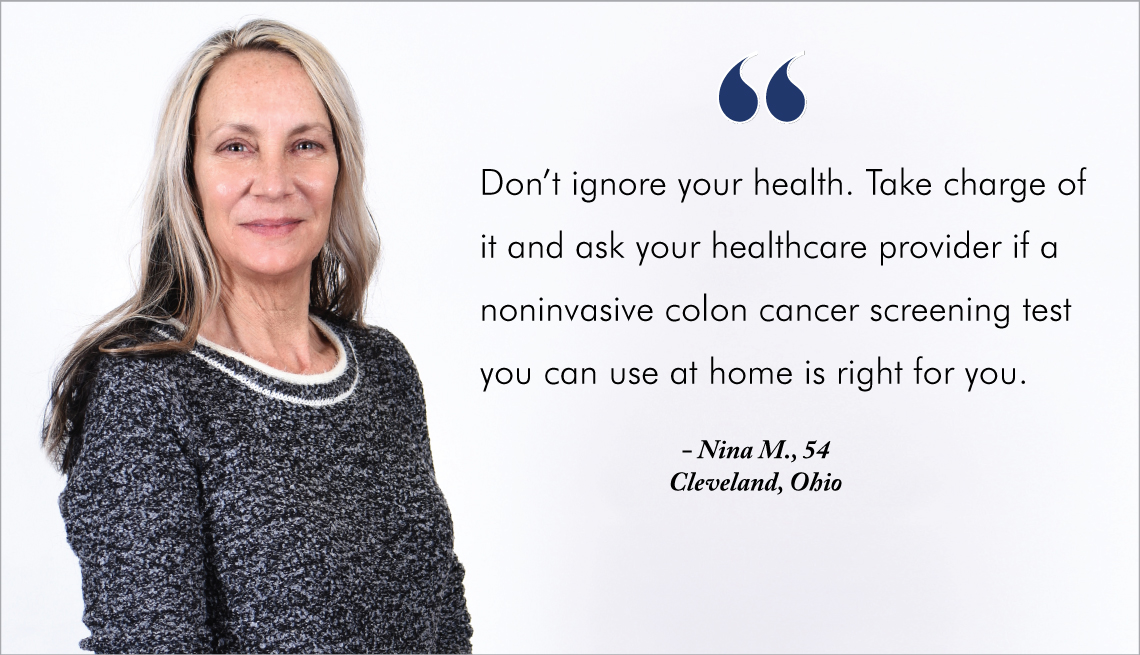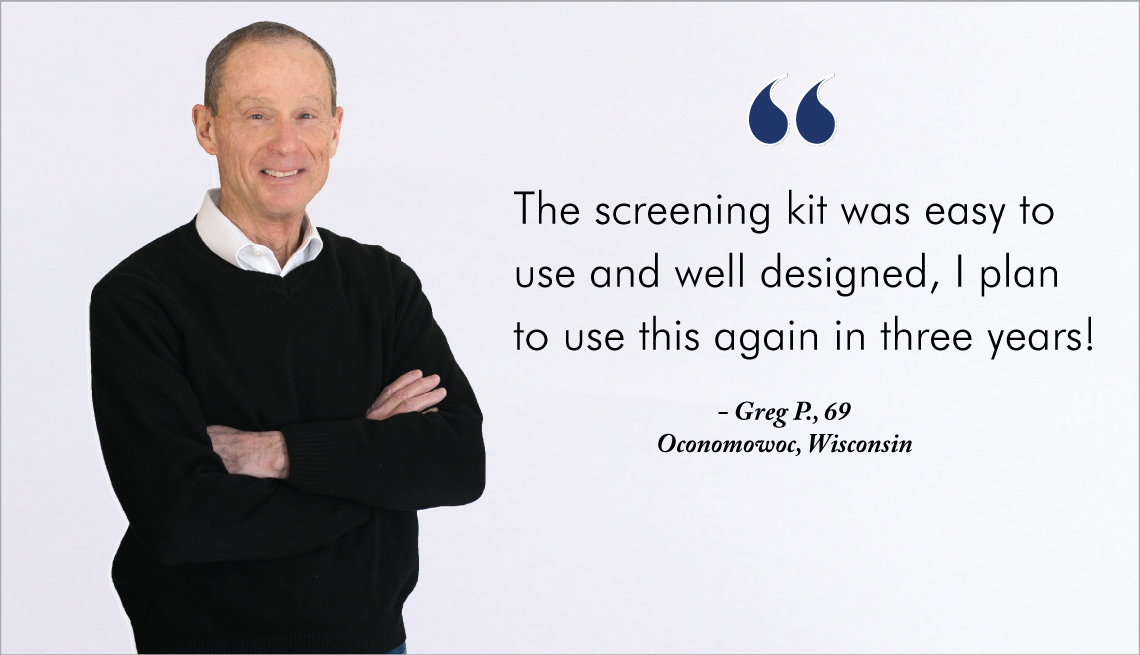Is Colon Cancer Screening Really That Important?
Get the facts for you and your loved one
When Nina turned 50, she had already been thinking about putting off her colonoscopy. She was busy and didn't have time for an invasive colon* cancer screening test that required a day of prep, time off work and arranging transportation to and from a procedure. Plus, she had no family history of colon cancer so she wondered how important it could really be.
At her annual check-up, her health care provider brought up scheduling her colonoscopy and Nina spoke honestly about what was holding her back. She was pleasantly surprised to hear
about an accurate, noninvasive alternative that can be used at home and agreed with her health care provider’s recommendation to use Cologuard, the only stool DNA test approved by the FDA for people 50 years and older who are at average risk for colorectal cancer.
Nina’s Cologuard test result was “positive,” meaning that it detected a potential abnormality that required her to schedule a follow up diagnostic colonoscopy, which indicated the presence of pre-cancer. Because of early detection, treatment was quick and successful.
Adults over 50 - What You Need to Know About Your Colon Cancer Risk
Of cancers that affect both men and women, colorectal cancer is the second leading cause of cancer-related deaths in the United States.1 In fact, it is estimated that there will be more deaths due to colorectal cancer than breast cancer in 2018.1 After age 50, your risk for colon cancer increases significantly, and your doctor will recommend regular screenings at this time for those at average-risk.2 The good news? When caught in the early stages, colon cancer has a 90% survival rate,† and screening is now easier than ever.3
"Nearly 40% of people have not had a colonoscopy to screen for or diagnose colon cancer at the recommended age – they put it off for years and years. Now with the availability of Cologuard as a screening test, they no longer have to put off colon cancer screening.” Dr. Ronald Koff, General Surgical Oncologist
It’s All About Early Detection
Meet Greg, he loves golfing, volunteering and traveling with his wife…he’s a busy guy! Greg was scheduled for his third routine colonoscopy, remembered the extensive preparation required and knew he didn’t want to go through that again. At a recent golf event he learned about the same stool DNA colon cancer screening test that could be done in the privacy of his home with no prep. After speaking with his doctor, Greg had his prescription filled and was relieved when the results came back negative.
And you can trust the science behind this stool DNA test too. Developed with Mayo Clinic, Cologuard’s proprietary stool DNA technology can analyze and detect 11 distinct biomarkers that identify cancer and precancer. And it finds 92% of cancer in stages I-IV.‡4 Plus it fits seamlessly into your life because there’s no prep, no diet or medication changes, you use it in the privacy of your own home, and it is covered by most major medical insurance for eligible patients and by Medicare as well. It’s that simple.
Give Yourself the Gift of Health
No more excuses - now there's no reason to put off screening! Early detection of colon cancer means catching it when it is most treatable. Be proactive about your health and talk to your healthcare provider about your screening options.
Take the first step for you or your loved one. Download the Cologuard Order Form and take it with you to your next doctor visit.
About Cologuard
Cologuard is intended for the qualitative detection of colorectal neoplasia associated DNA markers and for the presence of occult hemoglobin in human stool. A positive result may indicate the presence of colorectal cancer (CRC) or advanced adenoma (AA) and should be followed by diagnostic colonoscopy.
Cologuard is indicated to screen adults of either sex, 50 years or older, who are at typical average-risk for CRC. Cologuard is not for everyone; not for high risk individuals, including those with a family history of colorectal cancer, a personal history of colorectal cancer or advanced adenoma, IBD and certain hereditary syndromes. Positive Cologuard results should be referred to diagnostic colonoscopy. A negative Cologuard test result does not guarantee absence of cancer or advanced adenoma. Following a negative result, patients should continue participating in a screening program at an interval and with a method appropriate for the individual patient. Cologuard performance when used for repeat testing has not been evaluated or established. Rx only.
* When the term colon cancer is used in this article, it is intended to encompass colorectal cancer - which includes both colon and rectal cancer.
† 5-year survival rate
‡ Both false positives and false negatives do occur. In a clinical study of Cologuard, 13% of people without cancer or precancer tested positive.
Sources
1 American Cancer Society. Cancer Facts & Figures 2018 (PDF). Last revised January 4, 2018. Accessed July 24, 2018
2 American Cancer Society. Colorectal Cancer Facts & Figures 2017-2019 (PDF). Accessed July 24, 2018.
3 SEER Cancer Stat Facts: Colorectal Cancer. National Cancer Institute. Bethesda, MD
4 Imperiale TF, Ransohoff DF, Itzkowitz, et al. Multitarget stool DNA testing for colorectal-cancer screening. N Engl J Med. 2014;370(14):1287-1297.






